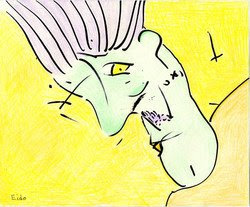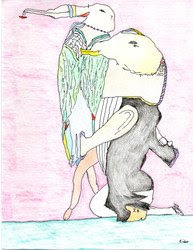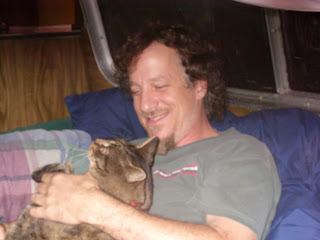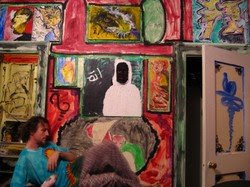
 |

|
 |

Paintings:
|
Drawings:
|
Albums:
|
Songs:
|
|
As I pull into a parking lot in Everett, Washington, I spot a man emerging from an old blue camper van. He looks instantly intrigued by my autographed vandominium and approaches me after I park.
"Hey there. So do you have problems with the clutch on that thing?" "No, it's automatic." The man looks impressed. When I mention that the van is a 1992, he laughs. "Yeah, mine's a 1979. But it looks like they're the same model." It's oddly comforting to meet somebody else who lives in his van, especially an old van. The comparisons don't end there. He also has his website (www.PoodlePublishing.com) advertised on his vanpartment, albeit less garishly than on mine.  The friendly stranger introduces himself as "Eido, you know, like Neato." He immediately verifies this as his full government name by showing me his license. He changed it from Floyd after living in Japan for seven years. The friendly stranger introduces himself as "Eido, you know, like Neato." He immediately verifies this as his full government name by showing me his license. He changed it from Floyd after living in Japan for seven years.
In Japanese, Floyd is pronounced with four syllables, the last two being ei-do. When the Japanese like someone, they shorten his name, so Floyd soon became known as Eido. A tireless and passionate artist, he would sign his paintings "Eido," but when somebody bought the art, the name on the check didn't vibe with the name on the painting, so he changed his name. "So in essence," Eido grins, "Eido is short for Floyd." The more I learn about Eido, the more I am intrigued by the unassuming artist. Like me, Eido is from Arizona, but we have taken different paths to our current situation. After graduating from Musicians Institute (Hollywood, CA), Eido was offered a position teaching the bass guitar at a school in Japan. After seven years there, he began feeling burned out, so he moved back to the States. Deciding that it was important to pursue his two greatest passions, he eventually moved to Seattle, where he joined bands as both a bassist and a drummer and continued his work as an artist. He became romantically linked to the lead singer of one of his bands and they moved in together. When the relationship took a turn for the worse, he found himself in a predicament. With an inherent need to create art, but a severe case of diabetes, he faced a future of settling. "I would be in the trenches if I could," he tells me in regards to his love for the art world, but the last time he tried to immerse himself in that world he found it was a lifestyle his disease would not let him sustain. He felt sick all So he now finds himself in Everett, living in his 1979 GMC van. "I'm almost embarrassed to admit," he smiles, "but I just got this one recently, and its a lot nicer than the last one." Eido works a ten-hour-a-day shift at the local printing press from Tuesday until Friday, then concentrates on his artwork on Saturday through Monday. The job is not particularly fun nor gratifying, but it allows him to keep producing art and paying for his insulin. "Living in the van allows me to spend my money on cool things like concerts, and paint, and tattoos."
He rolls down his shirt sleeves to reveal his biceps, each displaying one of his favorite original paintings. It doesn't take long to develop an appreciation for Eido's work, and I am not alone in my admiration. One of the restaurants in the shopping center we've parked at features many of Eido's paintings throughout its showroom. Eido agrees to do an interview for my documentary, but I am low on battery and he has to go to work, so we agree to do the interview at the printing press. Though Eido remains upbeat throughout the interview, it is not difficult to see that the job is a stifling necessity and nothing more. 
When I show up at the office and explain to the woman at the front desk that I am there to speak to Eido, she nods to me politely, but fails to mask her indifference, then says under her breath in a condescending and slightly too loud manner to her coworker, "He's here for Neato." Eido does the interview on his lunch break, but the situation seems rushed, so we plan to finish the interview in the morning as he finishes cooking his cup of chili. I show him this website and the cover for my book, which makes him smile. "The Hobo Diet, huh? I think I'm eating that right now. Hey, do you play chess?" he asks. "Yes. Just not very well." "Do you shoot hoops?" We plan to meet at LA Fitness (Eido with a guest pass) after he's done with work. I will school him at basketball and afterward he will school me at chess. I look forward to the evening. It gets lonely on the road and I could use the company. Only when evening comes, Eido calls to cancel. "Sorry, man," he says. "I'm just really tired." "That's okay. I'm tired too and I did nothing all day." When I meet him early the next morning, he apologizes. He was tired because of problems at work, where they have given him more responsibilities and work without the corresponding contractual pay increase. It saddens me to see such a talented and dedicated artist so marginalized as he tries to work through his struggles. But it's hard to feel bad for Eido very long. He has a kind presence and an imaginative spirit. He's the good kind of hippie, and that means something coming from me. He also has some companionship, in the form of his giant cat, ZenBhu (short for Zen Bhuddist). He picks up ZenBhu and pets her gently. "I just recently found out that she's a he," Eido tells me laughing. "For years, I thought my cat was a girl, but he's not. He's a neutered boy." I find this to be hilarious. ZenBhu is less amused. 
Unfortunately, Eido found out his cat's true gender from a veterinarian, because ZenBhu has feline immunodeficiency virus, or what is commonly referred to as feline AIDS. He was scratched in the face once and Eido came home to find that ZenBhu's face had blown up like a balloon.  "The doctor asked if I wanted to put him down, so I asked what ZenBhu's chances were for survival. The doctor said he had a 50-50 chance to live..." He pauses to kiss ZenBhu on the forehead. "So there was no way I was going to let him go." Other than his weight (he clearly needs to lay off the lasagna), ZenBhu is now the picture of feline health, and he seems perfectly content living in a van with his adoring owner. "He's the best thing I have going right now," Eido says affectionately. I have no doubt that will soon change.  To read more by the Author of this Blog, Please go to: Thanks Jeff Atkins |
|
|
|
| Tweet | |
|
|
|


